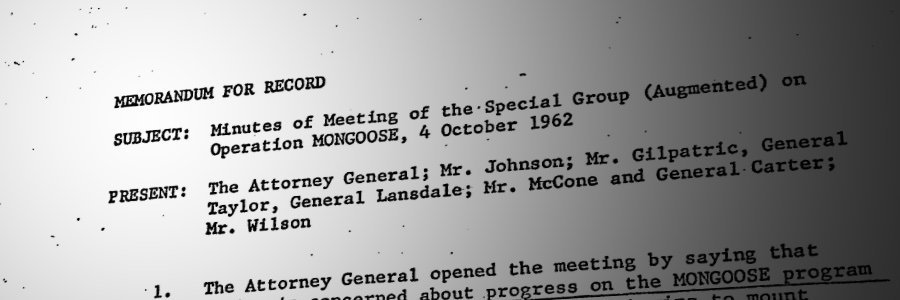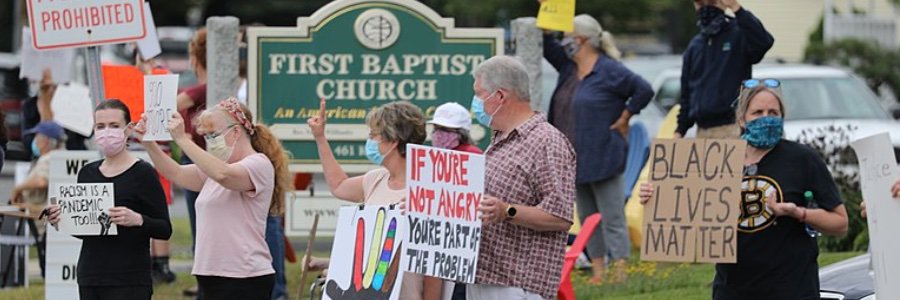
Jesse Franzblau is a freedom of information advocate and policy analyst at Open the Government, a Washington D.C.-based coalition that advocates for government transparency and accountability. This summer, Franzblau led an effort to shine light on the Trump administration’s family separation policy using FOIA, in collaboration with the Project on Government Oversight. On September 24th, both organizations released a batch of government documents, including an April 23rd memo signed by Secretary of Homeland Security Kirstjen Nielsen that acknowledges family separation as an intentional policy meant to deter migration- something that Nielsen has repeatedly denied.
For this week’s Requester’s Voice, MuckRock spoke with Franzblau about investigating immigration policy and the doing FOIA work under the Trump administration.
What is your current position and your background in public records work?
I’m a policy analyst with Open the Government. Open the Government is a nonpartisan coalition of over 100 organizations that works on open government, access to information, and accountability issues and I have been working on freedom of information for years. I used to work for the National Security Archive, doing FOIA work on U.S. foreign policy, and have worked a lot on the intersection of freedom of information laws, access to information, and human rights, justice, and accountability efforts. With Open the Government, I do a lot of work building the coalition and coordinating collaborative FOIA efforts to get information about the most pressing issues - work, for example, related to government spying, national security related surveillance, domestic surveillance, use of invasive surveillance technology by local law enforcement, coordination between local law enforcement and federal agencies. We also work on immigration policy, particularly under this administration, where immigration policy is at the forefront in terms of the critical issues to focus on. We’re trying to increase access to information for advocates on the ground and also for people trying to push back against policies that lead to a lot of abuses against undocumented communities, or refugee communities, and also the general public.
Has your work ever involved working directly with undocumented communities, or do you focus mostly on public records and government accountability?
We work very closely with immigration rights advocacy groups, that are more connected at the grassroots with directly-affected communities. In our coalition, Detention Watch Network is one. They’re a grassroots organization that has a lot of connections with undocumented communities. National Immigration Project and the National Lawyers Guild, we work with a lot. We work more with the advocates, but we also conduct trainings and workshops in different areas focused on using FOIA to get access to information, that can be used by groups on the ground, also by communities trying to get information about, for example, how law enforcement is using different types of technologies in their communities and how they collaborating with federal agencies.
How was the investigation that eventually produced the family separation policy memo in late September conceived? Where did you begin?
The FOIA request that led to the release of documents on family separation actually came in July when there were reports about the destruction of records and mishandling of information by border agents - basically not having a system in place to track the children that they were tearing away from their parents. And this Inspector General report that came out a few days ago really affirmed that - that they didn’t have a centralized tracking system as they were separating out the children and the parents. So that request came out of that, and we joined up with the Project on Government Oversight to file that request. But it also comes out of broader coordination with immigrant rights groups and we’ve been working a lot, with American Immigration Council and other groups that are involved in similar FOIA work. The American Immigration Council actually has a big litigation case going for similar documents that they haven’t even got a vaughn index on [after filing a FOIA request], but they are still fighting on that. But we filed a more narrow request and then tailored it down for the FOIA office, to just policy guidance, for records only from April until July, so a pretty narrow window. And in doing that we missed a lot of stuff that other groups are hopefully going to get.
I read a copy of the original request that you submitted. You’re saying you narrowed the scope of that request once DHS responded to you?
Yeah, so we got a response from DHS, and they asked us to narrow it down and so we gave them a more narrow window for the time frame and limited it to just to policy guidance. And it ended up being kind of odd that one of the documents in there is a 2008 document that had been released to other groups relating to the handling of minors in detention. t seems like this FOIA may have gotten pushed out the door before this Inspector General’s report came out this week because that deals with a lot of similar stuff. But I think there were some external factors, but part of the reason is because we narrowed the request and worked with the FOIA office to whittle it down.
When you filed the request, did you have the memo (that the Washington Post reported on in April) in mind as something you were hoping to get back?
We actually didn’t. That’s the kind of stuff we were hoping to get, but the request wasn’t specifically for that. We were trying to get a clearer understanding of how the family separation policy came to bet. We wanted to know if this was a meticulous policy that had very specific planning and understanding of what the consequences were going to be of the policy. hat we got from that memo is really confirming that they laid out these options with the understanding that the consequences were going to be massive separation of families. That memo helped confirm that they knew exactly what was going to happen as a result of this policy.
I’ve read through the documents that have been published as a result of your request. Was there information within those documents that came as a surprise to you or Open the Government? Or did it more serve the function of confirming what most already suspected about the family separation policy: that it was planned to cause so much harm?
We didn’t necessarily expect to get the emails because we asked mostly for policy guidance. But we did also ask for communications related to the response to the June 20th executive order, supposedly ending family separation. And then also the response to the court order to reunify the children. And some of the emails even have discussions of how they were speeding up deportation of families that are in detention to make room for new families as a result of the court order to bring families back together. So you start to see how chaotic it was, in some sense, but also how planned out it was in terms of that they knew that it was going to lead to this massive crisis. And that it was meant—it clearly is a measured deterrent, which they had denied again and again. That was also surprising that that came out in the documents. We knew, but having it out finally in official documents was important. And also seeing the responses to how they’re interpreting the Flores settlement, which is the legal standard for how they’re supposed to treat minors in detention. The other things that jumped out were references to updating their tracking systems, but those were so heavily redacted that it was hard to even know what those updates were.
Do you mean the sample log of detained minors in the document release?**
There’s a sample log, yeah, which it is isn’t even clear which document that is even attached to, if that’s attached to the main document or another document. It’s a little bit unclear. But it seems like from the IG report that came out this week, basically that was there M.O. They just had these old logs and no actual systematic, electronic, digital tracking system. And then they have that first memo which mentions the update to E3 system. But that’s all blacked out, so we don’t know what that update actually was. That’s one that’s kind of another tread of investigation. That IG reports actually mentions the E3 system, as they’re discussing their failure to even have a tracking system in place.
What are the implications of not having tracking system for children and families?
The implication is lost children, basically. There’s a lot of fears that these kids could be ending up in shady adoption systems, which is a growing fear. The longer the kids are away from their parents, the less likely it is that they’re going to end up being reunited with them, and of course there is the trauma that is imposed on them … But I think understanding the tracking system or lack thereof helps groups on the ground now that are in litigation over this issue. They’re really pushing this court order to get the government to actually turn over information, so that they can help reunite these families. The whole data collection part is key: what information they have, what information they’re keeping from lawyers, it’s really important. They found out that ICE had been withholding phone numbers that they had for a long time, even before the court order to reunite families, that they could have used to bring those families back together.
Phone numbers of migrants?
Of parents or of legal guardians, so a lot of children even had phone numbers written on their arm or phone numbers memorized, like in the chilling audio that came out of the detention center that the lawyer got and gave to ProPublica, one of the kids continues to recite a phone number. So ICE took down a lot of these numbers and had these numbers that they failed to even use, or turn that information over to lawyers on this case that would have helped them to actually help reunite families. A lot of this work is falling to NGOs trying to help reunite families because the government is stonewalling and not actually carrying out what the court has ordered them to do.
In the request, POGO and Open the Government ask for the request to be expedited. Was this request granted?
It’s interesting. The time frame in which they responded was definitely expedited. I’ve rarely seen stuff released that that fast. Everyone was kind of shocked by how quickly they gave it. But the response letter from CBP actually doesn’t mention the request for it to be expedited. So essentially they granted it, but they didn’t officially acknowledge it. The requirements for expedited processing is pretty high. Some agencies require it to be a life or death matter for it to meet expedited processing. And it’s pretty rare, I don’t know the exact figure, it’s pretty rare that they approve expedited processing. I’ve gotten mostly denials from most agencies. In this one, this is one of the most clear cases of where, public disclosure of information is literally directly associated with people’s lives at risk, in terms of that information being needed for groups on the ground to help reunify children.
So could that have played a role in how quickly the request was processed?
Maybe. And I think more so, just narrowing it down. We’re definitely going to argue that in the appeal, that this is still a matter of high urgency, to get this information. And I think we can argue that even more strongly. Now that we know pieces of what’s in these documents - there are huge redactions, and we need those unredacted. It’s interesting that they got it back this quickly. I’d like to say that they did adhere to that request for expedited processing, but they didn’t acknowledge that. Because for them to acknowledge that would be to acknowledge that they are actually holding children in kind of life or death situation - that the policy caused that. They kind of sidestepped that but still gave us information quickly.
Are you appealing to have the redactions lifted from the documents your received?
Yes. They used a lot of b(6) and b(7), so mainly the b(7) ones, the law enforcement exemption and b(7)(e), they used really extensively. So this exemption is used really broadly to protect law enforcement records that if the information is released could expose techniques that endanger law enforcement investigations or prosecutions. Obviously the information there [in the documents] isn’t related to investigations, but this exemption shouldn’t apply if unless they’re still prosecuting people at the border in the same way. Now, if they’ve actually changed the policy, then they shouldn’t be able to maintain that this is sensitive, that to disclose their techniques threatens prosecutions. We’re going to argue on those lines, trying to get the redactions lifted. And then their use of b(6) and b(7)(e) to hold on to redact the name of Nielsen is really absurd, and we’re going to fight on that one.
Can you talk to me a bit about the redaction of her name and signature? How did you go about confirming that she had signed?
The fact that the memo is addressed directly to her and that it is written by the highest level officials at DHS. The only person higher than them is her, so she would have to be the one signing off. And so it’s clear that she was the one that signed off on that. or high-level public officials, we’re going to argue that it shouldn’t be used to withhold the person’s name. They can argue that the signature can be used for fraud and fraudulent purposes if that got out, but they don’t need to redact the name, just the signature. Even on that memo, half of the names of the people who wrote the memo - their titles are redacted. I think it’s an absurd overuse of those exemptions. And we’re definitely going to argue that those redactions should be removed.
I read a letter published last week by Open the Government and POGO to the Senate Committee on Homeland Security and Governmental Affairs, using the memo to argue that Nielsen lied under oath about the existence and purpose of the child separation policy. Do you see any consequences coming out of this letter? How do you expect it to be received?
Some of the offices - we wrote a letter to Homeland Security and Governmental Affairs Committee asking them to look into this more deeply and question Nielsen again about this and that was received pretty well by some offices. So I think they’re going to make another push - use this to say wait a minute you said this in May, but then you actually had this memo in April saying something different. Our last recommendation in the letter is if they find that her responses under oath were questionable, that they should refer the case to the FBI, but we also know how far perjury statements tend to go now. But at least there’s definitely some offices that have been receptive to that. But I think DHS has already released a statement saying no, this doesn’t contradict what Nielsen says, these were just policy options, it doesn’t necessarily mean that this is what we did. So they’re going to try to snake around it, but it’s pretty clear that it contradicts the statements that she made.
Nielsen is testifying before the Committee on Homeland Security and Governmental Affairs next week, do you know what she’ll speak on?
That’s a broader “Threats to the Homeland” Committee hearing, where they talk about all broader DHS-related security issues, but we’re hoping that there will be some questions there about this.
What are Open the Government’s targets or goals moving forward on research around immigration policy? What are the next steps after this document release?
We are coordinating more collaborative work building off of that guide that we did in March, which is also available on the Reporters Committee for the Freedom on the Press FOIA wiki site. It’s a good resource. And we also ask for people if they have good FOIA success stories to add to that because it’s a place to cultivate stories of how FOIA has been successful. We’ve developed some lessons learned and recommendations there. Building on that we’re planning some different collaborative work to file requests at the state level to get information from local law enforcement agencies that are collaborating with the federal officials in the practice of separating families or other immigration enforcement practices. And then looking at international requesting, so using Mexico’s information law to get records about the border security issues and how U.S. and Mexico authorities have been coordinating on this. A lot of that stuff is happening right across their border, so Mexico is very heavily involved in some different ways also.
Have you noted any differences doing FOIA work under the Trump administration versus working with agencies under the Obama administration on immigration policy and other issues?
Some agencies have been somewhat the same. But it’s always hard to tell what’s obstruction or what’s just lack of resources or what’s lack of will. And what’s deliberate. But you’ve definitely seen like in the immigration space, our partners at TRAC have seen a lot of reduced information being released. So ICE just cutting away different fields, totals fields of information that they used to release related to detainee requests and related to police collaboration with ICE. A lot of that data has just kind of gone away and they’ve stopped giving that over through FOIA. So we’ve seen a lot of cases like that and different kind of obstructive responses. So there’s a lot of anecdotes of things that have changed, but it’s hard to really see a systematic change. I think there’s probably more actual inconsistencies than major changes, I think, in kind of the general old creaky wheels of how FOIA works.
Is there anything I didn’t ask you about that you think it’s important that people know about this specific document release or the broader work Open the Government is doing?
One last thing I have is the great resources that MuckRock has. It really adds a good platform for people all over the country to file related requests at the state level about what ICE is doing in their communities,, what kind of information sharing agreement do their local police have with ICE, etc. So I think MuckRock is a good platform for people to use to get information and then go ask their mayor what’s going on in their community. If people are being taken away by ICE, go check in with your mayor and council members on whether your city is a sanctuary city. If it’s not, what kind of policy changes might they be able to make? I think access to information is core to that effort.
Image via PXHere




